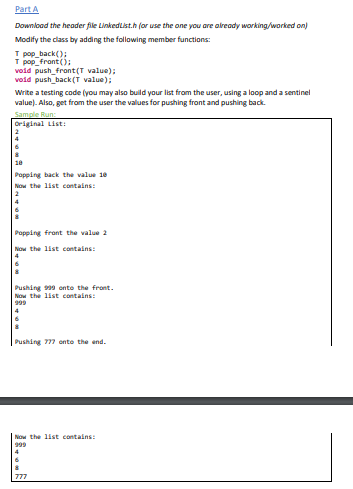Question: #ifndef LINKEDLIST_H #define LINKEDLIST_H #include using namespace std; template class LinkedList { private: // Declare a structure for the list struct ListNode { T value;
#ifndef LINKEDLIST_H #define LINKEDLIST_H #includeusing namespace std; template class LinkedList { private: // Declare a structure for the list struct ListNode { T value; struct ListNode *next; }; ListNode *head; // List head pointer public: LinkedList() // Constructor { head = nullptr; } ~LinkedList(); // Destructor void appendNode(T); void insertNode(T); void deleteNode(T); void displayList(); int search(T); // search function T getTotal(); int numNodes(); T getAverage(); T getLargest(); int getLargestPosition(); T getSmallest(); int getSmallestPosition(); }; //************************************************** // appendNode appends a node containing the value * // pased into newValue, to the end of the list. * //************************************************** template void LinkedList ::appendNode(T newValue) { ListNode *newNode, *nodePtr = nullptr; // Allocate a new node & store newValue newNode = new ListNode; newNode->value = newValue; newNode->next = nullptr; // If there are no nodes in the list // make newNode the first node if (!head) head = newNode; else // Otherwise, insert newNode at end { // Initialize nodePtr to head of list nodePtr = head; // Find the last node in the list while (nodePtr->next) nodePtr = nodePtr->next; // Insert newNode as the last node nodePtr->next = newNode; } } //************************************************** // displayList shows the value * // stored in each node of the linked list * // pointed to by head. * //************************************************** template void LinkedList ::displayList() { ListNode *nodePtr = nullptr; nodePtr = head; while (nodePtr) { cout value next; } } //************************************************** // The insertNode function inserts a node with * // newValue copied to its value member. * //************************************************** template void LinkedList ::insertNode(T newValue) { ListNode *newNode, *nodePtr, *previousNode = nullptr; // Allocate a new node & store newValue newNode = new ListNode; newNode->value = newValue; // If there are no nodes in the list // make newNode the first node if (!head) { head = newNode; newNode->next = nullptr; } else // Otherwise, insert newNode { // Initialize nodePtr to head of list and // previousNode to a null pointer. nodePtr = head; previousNode = nullptr; // Skip all nodes whose value member is less // than newValue. while (nodePtr != nullptr && nodePtr->value next; } // If the new node is to be the 1st in the list, // insert it before all other nodes. if (previousNode == nullptr) { head = newNode; newNode->next = nodePtr; } else // Otherwise, insert it after the prev. node. { previousNode->next = newNode; newNode->next = nodePtr; } } } //***************************************************** // The deleteNode function searches for a node * // with searchValue as its value. The node, if found, * // is deleted from the list and from memory. * //***************************************************** template void LinkedList ::deleteNode(T searchValue) { ListNode *nodePtr, *previousNode = nullptr; // If the list is empty, do nothing. if (!head) return; // Determine if the first node is the one. if (head->value == searchValue) { nodePtr = head->next; delete head; head = nodePtr; } else { // Initialize nodePtr to head of list nodePtr = head; // Skip all nodes whose value member is // not equal to searchValue. while (nodePtr != nullptr && nodePtr->value != searchValue) { previousNode = nodePtr; nodePtr = nodePtr->next; } // If nodePtr is not at the end of the list, // link the previous node to the node after // nodePtr, then delete nodePtr. if (nodePtr) { previousNode->next = nodePtr->next; delete nodePtr; } } } //************************************************** // Destructor * // This function deletes every node in the list. * //************************************************** template LinkedList ::~LinkedList() { ListNode *nodePtr, *nextNode = nullptr; nodePtr = head; while (nodePtr != nullptr) { nextNode = nodePtr->next; delete nodePtr; nodePtr = nextNode; } } //***************************************************** // search member function * //This function performs a linear search of the list. * //***************************************************** template int LinkedList ::search(T val) { int count = 1; ListNode *nodePtr = nullptr; nodePtr = head; while (nodePtr) { if( nodePtr->value == val) { return count; } else { nodePtr = nodePtr->next; count++; } } return 0; } //************************************************* // The getTotal function returns the total of * // all the nodes in the list. * //************************************************* template T LinkedList ::getTotal() { //write the function definition } //************************************************ // The numNodes function returns the number of * // nodes in the list. * //************************************************ template int LinkedList ::numNodes() { //write the function definition } //***************************************************** // The getAverage function returns the average * // of the values in the list. * //***************************************************** template T LinkedList ::getAverage() { //write the function definition } //************************************************* // The getLargest function returns the largest * // value in the list. * //************************************************* template T LinkedList ::getLargest() { //write the function definition } //************************************************* // The getLargestPosition function returns the * // position of the largest value in the list. * //************************************************* template int LinkedList ::getLargestPosition() { //write the function definition return position; } //************************************************* // The getSmallest function returns the smallest * // value in the list. * //************************************************* template T LinkedList ::getSmallest() { //write the function definition } //************************************************* // The getSmallestPosition function returns the * // position of the smallest value in the list. * //************************************************* template int LinkedList ::getSmallestPosition() { //write the function definition } #endif

Language:C++
Part Download the header flle Linkedlist for use the one you are already working/worked on Modify the class by adding the following member functions Top back(): Top front(): void push front (T value); void push back (T value); Write a testing code you may also build your list from the user, using a loop and a sentinel value). Also, get from the user the values for pushing front and pushing back Sample Run Poping back the value se Now the list contains: Popping front the value 2 Now the list contains: Pushing onto the front. Now the list contains: Pushing onto the end
Step by Step Solution
There are 3 Steps involved in it

Get step-by-step solutions from verified subject matter experts


